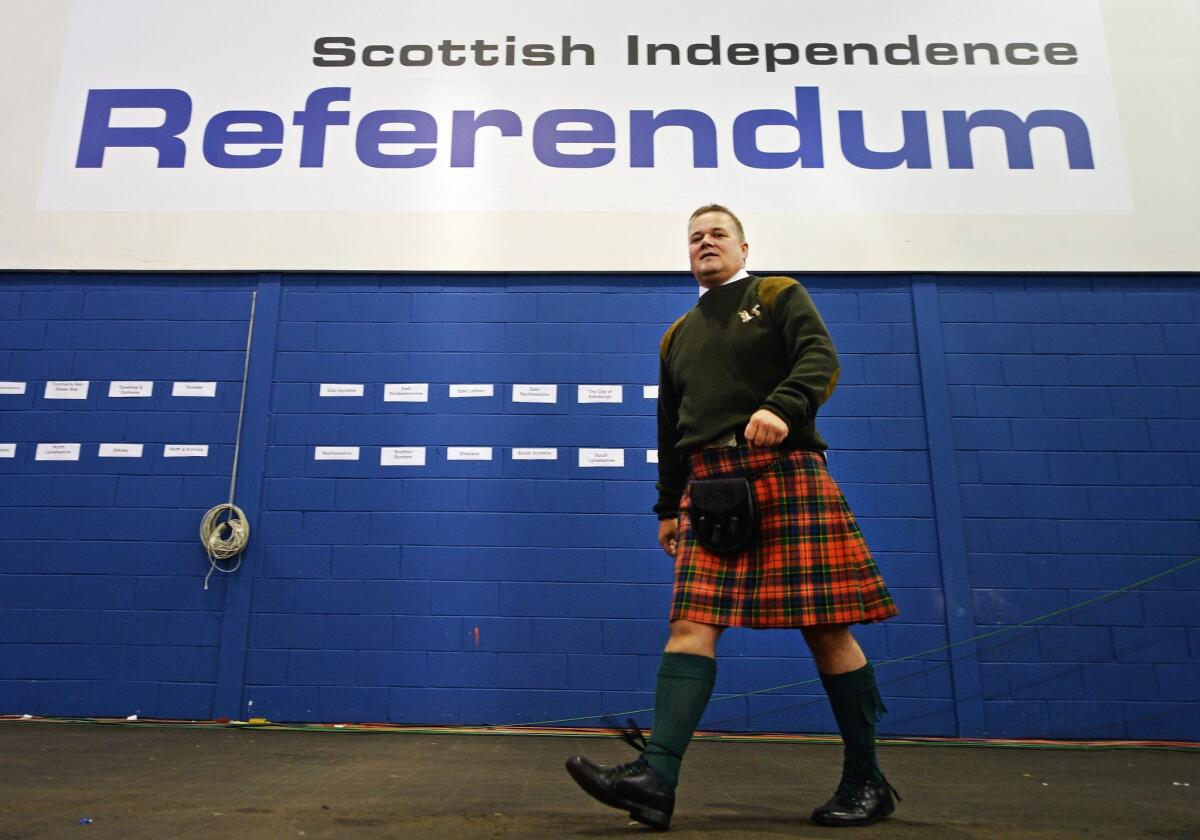Lawmakers in Scotland back referendum on independence from Britain

Reporting from LONDON — The Scottish Parliament on Tuesday backed First Minister Nicola Sturgeon’s call for a new referendum on independence, a day before the British government plans to trigger the start of its exit from the European Union.
Scottish lawmakers in Edinburgh voted 69 to 59 in favor of Sturgeon’s motion to ask British officials for an independence vote.
Sturgeon said the move was necessary to ensure Scotland has a say in its future as Britain prepares to severe or renegotiate ties with the remaining 27 nations in the EU, a move known as Brexit. In a June referendum, Britain as a whole voted to leave the EU, 52% to 48%, but Scottish voters favored remaining in the EU, 62% to 38%.
“My argument is simply this: When the nature of the change that is made inevitable by Brexit becomes clear, that change should not be imposed upon us, we should have the right to decide the nature of that change,” Sturgeon told the Scottish Parliament.
“The people of Scotland should have the right to choose between Brexit — possibly a very hard Brexit — or becoming an independent country, able to chart our own course and create a true partnership of equals across these islands,” she said.
Sturgeon had been encouraged by British Prime Minister Theresa May to find a way to keep Britain — comprising England, Scotland, Wales and Northern Ireland — strong and united as it forges ahead.
But Sturgeon felt she had to ask for a referendum after the prime minister said there could be no “half in, half out” option and indicated Britain was willing to walk away from the EU without any deal if the only option on the table was an unfavorable one.
The vote by Scotland’s legislature had been scheduled to take place last week but was delayed after the London attack that left five people dead, including the assailant, and about 50 injured.
This vote comes at a difficult time for May, who is expected to formally announce Britain’s plan to withdraw from the EU on Wednesday.
May is expected to send a letter to European Council President Donald Tusk that will trigger Article 50 of the Lisbon Treaty. That will set in motion a two-year withdrawal process involving such matters as trade, immigration and legal ties between Britain and the remaining EU countries.
Despite Tuesday’s vote, the decision on whether there will be an independence referendum for Scotland ultimately rests with May’s government in London, whose approval is necessary for the result to be legally binding.
May has already indicated that her government would block the move until after Brexit is complete.
Scotland’s previous referendum, in 2014, ended with voters opting against independence, 55% to 45%.
Sturgeon’s call for another referendum received support from the governing Scottish Nationalists and the Greens but was opposed by the Conservative and Labor parties.
The people of Scotland do not want “the division and rancor of another referendum campaign,” Scottish Conservative leader Ruth Davidson said.
Boyle is a special correspondent.
ALSO
Relatives of U.S. victims of London attack cope with pain and loss
The global implications for a Scottish piano concerto based on the Rosary
In Scotland, two sides rally on eve of independence vote
UPDATES:
2:00 p.m.: This article was updated with Times reporting.
9:45 a.m.: This article has been updated with reaction, details and background.
This article was originally published at 9:30 a.m.
More to Read
Sign up for Essential California
The most important California stories and recommendations in your inbox every morning.
You may occasionally receive promotional content from the Los Angeles Times.










